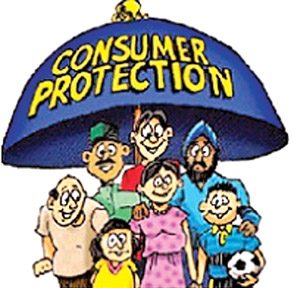Quality assurance programs vital to protect consumers
By Dr. Lalith Senaweera
With the globalisation of trade, the products manufactured by
different countries move fast within the globe and therefore, markets
are becoming choosy and competitive.
 In this context, it is pertinent to look after the interests of
consumers or the public as many products have an impact on health or
safety. In this context, it is pertinent to look after the interests of
consumers or the public as many products have an impact on health or
safety.
The consumers expect the products that they buy to be safe or fit for
consumption and, therefore, manufacturers and importers have a
responsibility to meet their expectations.
One way of assuring this is to have a sound quality assurance program
within the country and it should be country specific as it is based on
the Quality Infrastructure of that country.
In any Quality Assurance program consumer protection and minimising
of health and safety related issues are two essential elements and are a
shared responsibility of national governments, the regulatory bodies and
consumers.
Health
However, there is increasing public concern about the health and
safety of products available in the market as there have been serious
cases reported in the past decade with regard to effects on public
health and the social significance of the issues because of the use of
sub standard products.
Due to this almost all countries use a regulatory regime to protect
consumers from receiving substandard products especially those having an
impact on health and safety, by using effective legislation based on the
principles of risk-based approaches to handle health and safety issues
in the market.
These mechanisms are crucial in enabling countries to assure the
quality, safety and health of products entering international trade and
to ensure that imported products conform to national standards as
national standards cover the basic needs and wants of that country.
It is for these reasons that standard based product assessments are
important for any country as it provides quality assured products to
consumers.
Regulatory approach
 Normally regulators before issuing any regulations consult the
relevant Institutions and obtain the views of those Institutions to
ensure that there is really a need to bring in such products under
regulations to assure its quality. Normally regulators before issuing any regulations consult the
relevant Institutions and obtain the views of those Institutions to
ensure that there is really a need to bring in such products under
regulations to assure its quality.
It is also necessary to take into consideration Technical Barriers To
Trade (TBT) and Sanitary and Phytosanitary agreements of the World Trade
Organisation WTO) to avoid unnecessary barriers in the market.
Based on that consultation process the regulators issue directives if
there is a need to regulate the markets covering those products for the
benefit of the customers. Regulators should be open, and keep
regulations simple and user-friendly.
In the regulatory approach, it is mandatory for Institutions to
establish, manage, coordinate and monitor the quality control and
quality assurance systems and their integral standard operating
procedures and other quality documents to provide quality products and
services to fully satisfy customer needs and expectations.
This process would help the Institutions to carry out the
implementation of regulations in an efficient and effective manner so
that stakeholders would benefit.
The executing institutions need to be strengthened with the resources
such as inspection, testing, surveillance and administration work
related to the implementation of the regulations that need to be
coordinated and implemented without undue delay.
Quality assurance
Sri Lanka has a number of institutions which have the authority to
regulate products to ensure that the consumers receive quality assured
products.
The Sri Lanka Standards Institution (SLSI) being the national
standards body of Sri Lanka, engages in monitoring the quality of the
selected items which have an impact on health and safety based on the
regulations issued under the Import and Export Control Act. SLSI has
devised a scheme to assure the quality of 121 products based on Gazette
notification 1844-49 of 2014-01-08 under the Import and Export Control
Act No.1 of 1969.
As the executing authority, the Institution ensures the conformity of
consignments of the designated items for import based on -
a) Acceptability of the conformity certificate/s supporting the
consignment, from the exporting country.
b) Acceptability of the Product Certification Mark issued by the
National Standard body of the exporting country or National Standards
body of another country.
c) Reliability and past experience with the manufacturer of the
product from the exporting country.
The SLSI has developed the assessment mechanism based on
international guidelines to provide the maximum assurance to the
consumer about the quality of the designated items while providing a
speedy service to clients.
The criteria used are - Consignments accompanied by acceptable
conformity certificates from an overseas laboratory or an inspection
agency or any other Government Institution registered with the SLSI.
Consignments with a Conformity Certificate from the National
Standards body of the exporting country. Conformity Certificate should
be issued in accordance with the relevant Sri Lanka Standard
Specification. Consignment imported from a manufacturing plant
registered with the SLSI.
A Conformity Certificate should accompany each and every consignment
from the manufacturing plant. Consignments of products carrying 'Product
Certification Mark' of the National Standards body of any country where
the standard used for the said certification is compatible with the
corresponding Sri Lanka Standard Specification.Consignments which do not
fall into any of the above categories will be checked by drawing samples
against the applicable Sri Lanka Standard.
SLSI at present monitors the quality of 121 products and makes
recommendations to the Customs based on the above criteria
Benefits: Prevents sub standard products reaching the country and
customers, Protective barrier against dumping of any kind of product
having a bad impact on consumer health and safety, Saves valuable
foreign exchange by stopping the import of substandard products,
Strengthens society by providing them quality assured products as the
consumers are protected from unnecessary health and safety issues.
Importers are educated to go for quality products as they receive
valuable inputs about the status of the product imported.
The International Organisation for Standardisation has published a
series of standards on food safety as international standards are needed
to ensure the safety of the global food supply chain. The ISO 22000
family contains a number of standards each focusing on different aspects
of food safety management. ISO 22000:2005 contains the overall
guidelines for food safety management.
ISO-TS 22004:2005 contains guidelines for applying ISO 22000. ISO
22005:2007 focuses on traceability in the feed and food chain. ISO
22000:2205 specifies needs for a food safety management system where an
organisation in the food chain has to demonstrate how to control food
safety hazards to ensure that food is safe at the time of human
consumption.
The standard for Food Safety Management Systems processes and
procedures necessitates that organisation implement prerequisite
programs and HACCP. ISO 22000 is a generic food safety management
standard and can be used by any organisation directly or indirectly
involved in the food chain.
It applies to all organisations in the food chain. It doesn't matter
how complex the organisation is or what size it is, ISO 22000 can help
ensure the safety of food products. The food chain also includes
organisations that do not directly handle food.
These include organisations that produce feed for animals that
produce food and for animals that will be used as food. It also includes
organisations that produce materials that will eventually come into
contact with food or food ingredients.
Structure of ISO 22000:2005
The ISO 22000 standard includes five sections covering the setting up
of a sound food safety management system.
Section 4: General Requirements. Section 5: Management
Responsibility. Section 6: Resource Requirements. Section 7: Planning
and Realisation. Section 8: Validation, Verification and Improvement.
Implementation
Application of an effective ISO 22000:2005 Food safety Management
system needs the commitment of the management and involvement of every
employee in the company.
An effective application of ISO 22000:2005 leads to: Identification
of critical control points to limit technical resources targeted at the
management of food safety program, Disciplined and a systematic approach
for continuous improvement in product safety, Providing confidence to
consumers on food safety and assisting in demonstrating food safety and
food hygiene regulations, Demonstrates the professional approach of the
organisation in implementing food safety system and enables the
organisation to compete more effectively in international markets,
Places the responsibility for ensuring food safety on the organisation,
Brings management commitment and encourages people from all operational
areas to take an active role in planning and implementing food
protection controls, Encourages in-depth understanding and familiarity
with the procurement process of raw materials, manufacturing system and
storage and distribution, emphasising hazard prevention early in the
food production system.
Increase awareness among the employees of the organisation about the
important techniques that control the safety of food. Communicate
effectively food safety issues to suppliers, customers and interested
parties in the food chain.
Benefits: It is internationally recognised as one of the most
effective food safety management systems of controlling food related
problems worldwide. It is compatible with any other management system.
e.g. ISO 9001. It demonstrates management commitment to food safety.
Role: SLSI has devised a scheme to certify organisations against ISO
22000 Food Safety Management System standard and today over 100
organisations have been certified under the scheme.SLSI has 30
professionally qualified auditors who provide valuable input to business
enterprises to improve and maintain an effective Food Safety Management
System while helping them to penetrate international markets. |

